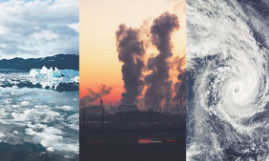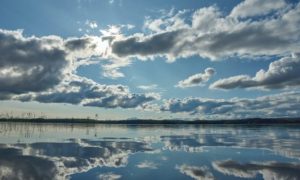Update
World Meteorological Day
World Meteorological Day is celebrated every year on 23 March to commemorate the entry into force in 1950 of the convention that created the World Meteorological Organization. The day also highlights the contribution that national meteorological and hydrological services make to the safety and well-being of society.
About
World Meteorological Day takes place on 23 March every year, commemorating the establishment of the World Meteorological Organization (WMO) on 23 March 1950. As a specialized agency of the United Nations, the WMO is dedicated to international cooperation and coordination on the state and behavior of the Earth’s atmosphere, its interaction with the land and oceans, the weather and climate it produces, and the resulting distribution of water resources.
Within its mandate in the areas of weather, climate and water, the WMO focuses on many different aspects and issues from observations, information exchange and research to weather forecasts and early warnings, from capacity development and monitoring of greenhouse gases to application services and much more. It has 193 member states/territories and it works in coordination with a network of the national meteorological and hydrological services around the world.
The WMO originated from the International Meteorological Organization (IMO), founded in 1873, to facilitate the exchange of weather information across national borders. Established in 1950, the WMO became a specialized agency of the United Nations in 1951. Its mandate is in the areas of meteorology (weather and climate), operational hydrology and related geophysical sciences. Since its establishment, the WMO has played a unique and powerful role in contributing to the safety and welfare of humanity. It has fostered collaboration between the national meteorological and hydrological services of its Members and furthered the application of meteorology in many areas.
The WMO continues to facilitate free and unrestricted exchange of data and information, products and services in real- or near-real time on matters relating to safety and security of society, economic welfare and the protection of the environment. It contributes to policy formulation in these areas at national and international levels.
In addition, the WMO plays a leading role in international efforts to monitor and protect the environment through its various programs. In collaboration with other United Nations agencies and national meteorological and hydrological services, the WMO supports the implementation of a number of environmental conventions and is instrumental in providing advice and assessments to governments on related matters. These activities contribute towards ensuring the sustainable development and well-being of nations.
Yearly Theme and Activities
Since 1961, the World Meteorological Organization has been celebrating World Meteorological Day with a different theme selected for each year. Find more information for each year below:
- 2022 | Early Warning and Early Action
- 2021 | The ocean, our climate and weather
- 2020 | Climate and water
- 2019 | The Sun, the Earth and the Weather
Role of Geneva
International Geneva
Geneva and its surrounding area host important international organizations working on climate and meteorology, presented below by alphabetical order.
Group on Earth Observations (GEO)
The Group on Earth Observations (GEO) is a partnership of more than 100 national governments and in excess of 100 Participating Organizations that envisions a future where decisions and actions for the benefit of humankind are informed by coordinated, comprehensive and sustained Earth observations.
Internal Displacement Monitoring Centre (IDMC)
The Internal Displacement Monitoring Centre (IDMC) provides data and analysis and supports partners to identify and implement solutions to internal displacement. In its thematic work on climate change, the IDMC explores scale, patterns, drivers and impacts of internal displacement associated with slow-onset environmental change and disasters to inform policies and practices for managing and reducing displacement risk.
Intergovernmental Panel on Climate Change (IPCC)
The Intergovernmental Panel on Climate Change (IPCC) is the United Nations body for assessing the science related to climate change. The IPCC provides regular assessments of the scientific basis of climate change, its impacts and future risks, and options for adaptation and mitigation.
R20 Regions of Climate Action
R20 Regions of Climate Action is a non-profit international organization with a mission is to accelerate sub-national infrastructure investments in the green economy to meaningfully contribute to the Sustainable Development Goals (SDGs) and for a future that involves inclusive, resilient, and low-carbon societies.
UN Climate Change Learning Partnership (UN CC:Learn)
The UN Climate Change Learning Partnership (UN CC:Learn) is a collaborative initiative of 36 multilateral organizations working together to help countries build the knowledge and skills they need to take action on climate change. These include better climate literacy and other crucial skills to tackle this challenge.
United Nations Office for Disaster Risk Reduction (UNDRR)
The United Nations Office for Disaster Risk Reduction (UNDRR) brings governments, partners, and communities together to reduce disaster risk and losses and losses to ensure a safer, more sustainable future. UNDRR oversees the implementation of the Sendai Framework for Disaster Risk Reduction 2015-2030, supporting countries in its implementation, monitoring and sharing what works in reducing existing risk and preventing the creation of new risk. This includes crucial work on the impacts of climate change and extreme weather events.
World Economic Forum
The World Economic Forum is an independent international organization committed to improving the state of the world by engaging business, political, academic and other leaders of society to shape global, regional and industry agendas. Incorporated as a not-for-profit foundation in 1971, and headquartered in Geneva, the Forum is tied to no political, partisan or national interests. The WEF Global Risks reports identify and analyse critical global risks, among which environmental risks and extreme weather events have been flagged as a critical area.
World Meteorological Organization (WMO)
The World Meteorological Organization (WMO) is an intergovernmental organization with a membership of 193 Member States and Territories. It originated from the International Meteorological Organization (IMO), the roots of which were planted at the 1873 Vienna International Meteorological Congress. Established by the ratification of the WMO Convention on 23 March 1950, the WMO became the specialized agency of the United Nations for meteorology (weather and climate), operational hydrology and related geophysical sciences a year later. The Secretariat, headquartered in Geneva, is headed by the Secretary-General and its supreme body is the World Meteorological Congress. WMO also hosts the WMO Global Campus, a collaborative network of WMO Member institutions and National Meteorological Hydrological Services involved in the development and delivery of education and training.
Local Geneva
MeteoSwiss
Acting on behalf of the Federal Government, MeteoSwiss provides various weather and climate services for the protection and benefit of Switzerland.
Société Astronomique de Genève
The Geneva Astronomy Society is the meeting point for astronomy enthusiasts in Geneva. It offers weekly gatherings with conferences or stargazing activities, as well as special events during eclipses, shooting star nights, comets, etc. The activities cater to both beginners and experienced amateur astronomers.
University of Geneva (UNIGE)
Founded in 1559 by Jean Calvin, the University of Geneva (UNIGE) is dedicated to teaching, research and dialogue with society. With more than 17’000 students of some 150 different nationalities, it is Switzerland’s second largest university. The Institute for Environmental Sciences bridges disciplines to foster education and research on environmental issues, including climate change and its impacts. Specialized research programmes investigate regional climate simulations, causal links between unstable climatic factors and natural disasters, impacts of climate extremes, and more.
Learning

Climate Change: From Learning to Action
Online | UN CC: E-Learn

Climate Change International Legal Regime
Online | InforMEA

WMO Learn
Learning events, resources, and information about collaborative projects from WMO Global Campus
Resources
- MeteoWorld | WMO
- WMO for Youth | WMO

